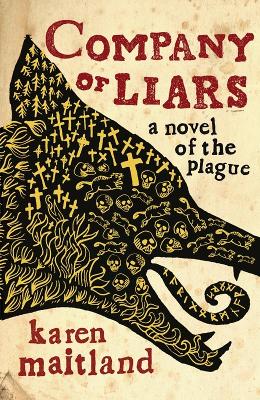
Midsummer's Day, 1348.
On this day of ill omen, plague makes its entrance. Within weeks, swathes of England witll be darkened by death's shadow as towns and villages burn to the ringing of church bells.
While panic and suspicion flood the land, a small band of travellers comes togther to outrun the breakdown in law and order. But when one of their number is found hanging from a tree, the chilling discovery confirms that something more sinister than plague is in their midst. And as the runes warn of treachery, it appears no one is quite what they seem, least of all the child rune reader, who mercilessly compels each of her companions to tell their stories. And face the consequences.
Take a leap of imagination and embark on an unforgettable journey through the ravgaed countryside ... with only a scarred trader in holy relics, a conjuror, two musicians, and a deformed storyteller for company.
Although I gave it 4 stars, it's closer to a 3.5. Company of Liars has been advertised as a reinterpretation of The Canterbury Tales, but it's been so long since I read Chaucer (and it was only excerpts, if I'm remembering my freshman high school English class correctly) that I didn't have much to compare it to. Standing on its own, Company of Liars is a solid historical mystery. Nine people are traveling together across England to escape the plague, and each is hiding a secret from his companions.
On the downside, by the time each secret was revealed, I'd already guessed it (although this may be intentional, since the narrator's reveal starts with, "As you may have guessed..."). However, I still found myself compelled to keep reading to find out more. When I'm reluctant to put the book down to go to sleep, that's a good sign.
Reading updates
-
Started reading
-
25 March, 2009:
Finished reading
-
25 March, 2009:
Reviewed
